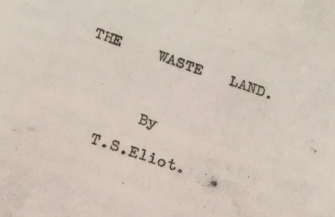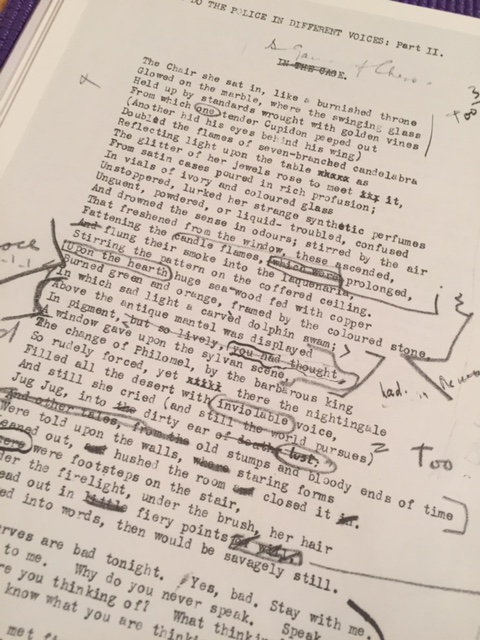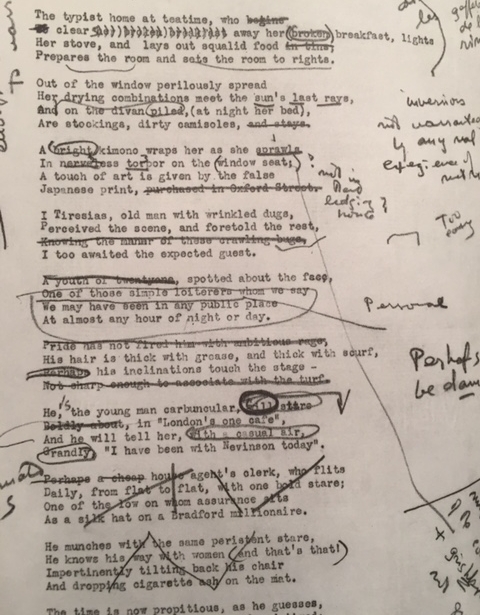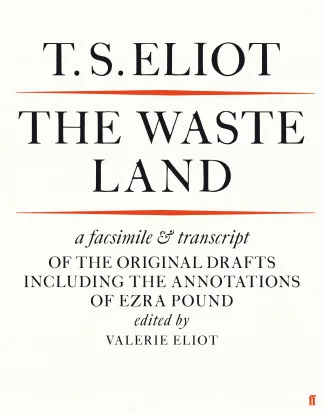T.S. Eliot: The Waste Land Manuscript
"I should like to present you the MSS of the Waste Land, if you would care to have it—when I say MSS, I mean that it is partly MSS and partly typescript, with Ezra's and my alterations scrawled all over it." —T.S. Eliot to John Quinn, lawyer, patron, art collector, and friend to Eliot and Ezra Pound
Forging Poetry: Balancing Work and Creativity
"The great thing I am trying to learn is how to use all my energy without waste, to be calm when there is nothing to be gained by worry, and to concentrate without effort." —T.S. Eliot to Henry Eliot, 13 December 1921 (as quoted from The Waste Land Facsimile)
The Waste Land, it would seem, was born out of repose and fervent dedication. Ever since his move to England in 1914, Eliot struggled to earn a living while still maintaining energy for his creative works. By 1918, he worked in a bank during the day, taught two lectures per week in the evenings, and served as assistant editor for a monthly periodical. His choices for work, though chosen for financial reasons, were largely determined by how they could serve his writing. Bank work allowed Eliot to close shop at five p.m. and was far less cumbersome than teaching. Preparing for lectures offered opportunities for research; serving as editor satisfied his love of editing.
By 1921, Eliot's health began to suffer enough that his doctor recommended a few months' reprieve. His bank generously offered him paid leave, and Eliot left for Switzerland for medical attention and rest. The rest allowed him to work on "a long poem" that had been on his mind.
The Poem
"I am certainly well enough to be working on a poem." —T.S. Eliot from Switzerland to Henry Eliot, 13 December 1921, referring to his new work on The Waste Land (as quoted from The Waste Land Facsimile)
Fellow writer Ezra Pound played an important role in supporting Eliot artistically, and at times, even financially (he secretly contributed to Eliot's editorship salary). Eliot was especially indebted to Pound for his assistance in editing The Waste Land.
Below you will find images of the facsimile that contain both Eliot and Pound's editorial markings.
A Bit of the Omitted
"In the manuscript of The Waste Land which I am sending you, you will see the evidences of his work, and I think that this manuscript is worth preserving in its present form solely for the reason that it is the only evidence of the difference which his criticism has made to this poem...." —T.S. Eliot to Quinn (regarding Pound's contributions), 21 September 1922.
Below are lines that Pound suggested Eliot remove from the poem. Although Eliot did not follow all of Pound's recommendations, he did make significant changes to the poem thanks to Pound's attention. The following lines were not included in the final poem.
"A line, a white line, a long white line, / A wall, a barrier, towards which we drove." —T.S. Eliot, omitted lines from The Waste Land, as suggested by Ezra Pound
"And through the forenoon watch, the wind declined; / Thereafter everything went wrong." —T.S. Eliot, omitted lines from The Waste Land, as suggested by Ezra Pound
"Pride has not fired him with ambitious rage." —T.S. Eliot, omitted lines from The Waste Land, as suggested by Ezra Pound
"There where the tower was traced against the night." —T.S. Eliot, omitted lines from The Waste Land, as suggested by Ezra Pound
Manuscript Legacy
It was good news for everyone when Knopf Publishing agreed to publish The Waste Land. As a gesture of gratitude for his friend's support, Eliot offered to give John Quinn the manuscript. Quinn responded in a letter:
"I shall be glad to have the MS. of Waste Land but I shan't let you 'present it to me'. When you finish the whole thing, poetry and prose, if you will send the MS. or the MSS to me, I shall be glad to have it, but you must agree to the condition that I send you draft for what I think it is worth. I shall feel happier to do it that way." (28 July-1 August 1922)
After a bit of back and forth (with Eliot rejecting payment for the manuscript and Quinn ultimately insisting on payment), Quinn had the manuscript appraised by a book dealer. For about $140, he acquired the manuscript and received the papers on January 13, 1923. Nearly thirty years later, they were pulled out of storage, unearthed by Quinn's niece. She sold them to the Berg Collection of the New York Public Library for $18,000 on April 4, 1958. The sale was kept a secret from the public—including Eliot—until 1968 when the Library announced the purchase publically.
Additional Resources
For more information regarding Pound's contributions, read the British Library's article, "Ezra Pound and the drafts of The Waste Land."
See the facsimile in the British Library online archives. The original is in the Berg Collection of the New York Public Library.
All quotes and background information presented in this article are derived from the Introduction to T.S. Eliot The Waste Land: A Facsimile and Transcript, edited by T.S. Eliot's second wife, Valerie Eliot.
*Frontispiece
First page from Eliot's typescript/manuscript; from The Waste Land: A Facsimile and transcript of the Original Drafts, Including the Annotations of Ezra Pound. Edited by Valerie Eliot.
*All images © Estate of T. S. Eliot and reprinted by permission of Faber & Faber Ltd.










